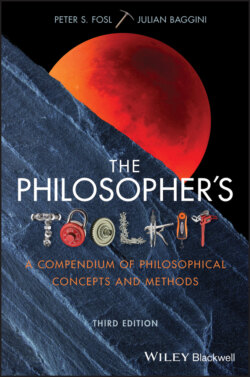Читать книгу The Philosopher's Toolkit - Julian Baggini, Julian Baggini - Страница 27
Defining induction
ОглавлениеPerhaps most familiar to people is a kind of induction that involves reasoning from a limited number of observations to wider generalisations of some probability. Reasoning this way is commonly called inductive generalisation. It’s a kind of inference that usually involves reasoning from past regularities to future regularities. One classic example is the sunrise. The sun has risen regularly each day, so far as human experience can recall, so people reason that it will probably rise tomorrow. This sort of inference is often taken to typify induction. In the case of my Roman holiday, I might have reasoned that the past experiences of people with average cognitive abilities like mine show that the probabilities of winning against the man with the cups is rather small.
But beware: induction is not essentially defined as reasoning from the specific to the general. An inductive inference need not be past–future directed. And it can involve reasoning from the general to the specific, the specific to the specific, or the general to the general.
I could, for example, reason from the more general, past‐oriented claim that no trained athlete on record has been able to run 100 metres in under 9 seconds, to the more specific past‐oriented conclusion that my friend had probably not achieved this feat when he was at university, as he claims. Reasoning through analogies (see 2.4) as well as typical examples and rules of thumb are also species of induction, even though none of them involves moving from the specific to the general. The important property of inductive inferences is that they determine conclusions only with probability, not how they relate specific and general claims.
